物业管理英语第一讲
物业管理专业英语
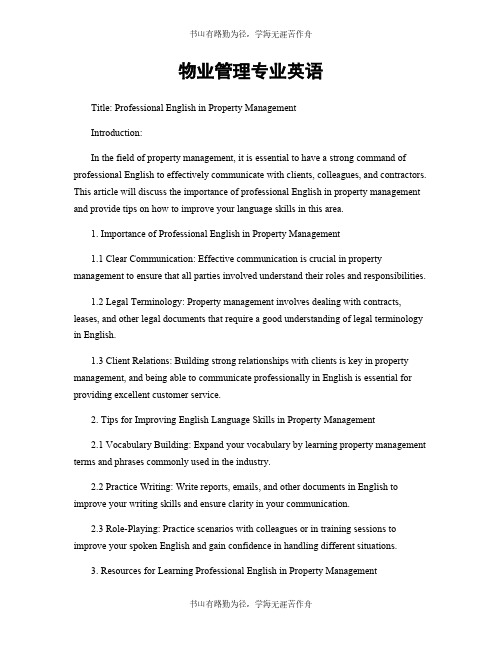
物业管理专业英语Title: Professional English in Property ManagementIntroduction:In the field of property management, it is essential to have a strong command of professional English to effectively communicate with clients, colleagues, and contractors. This article will discuss the importance of professional English in property management and provide tips on how to improve your language skills in this area.1. Importance of Professional English in Property Management1.1 Clear Communication: Effective communication is crucial in property management to ensure that all parties involved understand their roles and responsibilities.1.2 Legal Terminology: Property management involves dealing with contracts, leases, and other legal documents that require a good understanding of legal terminology in English.1.3 Client Relations: Building strong relationships with clients is key in property management, and being able to communicate professionally in English is essential for providing excellent customer service.2. Tips for Improving English Language Skills in Property Management2.1 Vocabulary Building: Expand your vocabulary by learning property management terms and phrases commonly used in the industry.2.2 Practice Writing: Write reports, emails, and other documents in English to improve your writing skills and ensure clarity in your communication.2.3 Role-Playing: Practice scenarios with colleagues or in training sessions to improve your spoken English and gain confidence in handling different situations.3. Resources for Learning Professional English in Property Management3.1 Online Courses: Enroll in online courses specifically tailored to property management professionals to improve your language skills.3.2 Industry Publications: Read industry publications and websites in English to stay updated on trends and developments in property management.3.3 Networking Events: Attend conferences, seminars, and networking events where you can interact with other professionals and practice your English language skills.4. Common English Phrases and Expressions Used in Property Management4.1 "Tenant Screening": The process of evaluating potential tenants to ensure they are suitable for a rental property.4.2 "Maintenance Request": A formal request from a tenant for repairs or maintenance services on the property.4.3 "Property Inspection": A thorough examination of a property to assess its condition and identify any issues that need to be addressed.5. ConclusionIn conclusion, having strong English language skills is essential for success in property management. By understanding the importance of professional English, following tips for improvement, utilizing resources for learning, and familiarizing yourself with common phrases and expressions used in the industry, you can enhance your communication skills and excel in your role as a property manager.。
管理英语第一单元讲义01

Unit 1 Management FunctionsTeacher:Class Profile:Estimated time: 500 minutes in 10 periodsI Unit Objectives1. Students can fully understand the main ideas of the two reading passages aboutmanagement functions, successfully answer the comprehension questions, andindependently finish the language exercises.2. Students can identify the major elements of business letters and do simulated writingusing the common sentence structures learned from the samples.3. Students can understand conversations about establishing business relationship.4. Students can use recommended expressions to talk about establishing businessrelationship.5. Students can use the materials in this unit and those from other resources to accomplishin groups the field work project on management functions and then present the work inclass.II Materials and/or Equipment Needed1.English for Management2.Overhead projectorputerIII Unit ArrangementPeriods 1-3: Reading APeriods 4: Reading BPeriods 5-6: Simulated WritingPeriods 7-8: Listening and SpeakingPeriods 9-10: Field Work PresentationIV Teaching ProceduresPeriods 1-2 Reading A1.Introduction to Unit field work and lead-in to Reading A 10 min.a.Describe a situation where management functions are involved and introduce thefield work project by saying, for example:Hello, class. If you were the manager of a business company, what would you do tokeep your company running in the best possible state? Well, here is a chance foryou to find it out. You have about two weeks while we are learning this Unit, toaccomplish a field work project, which means a research task you do outside theclass. You are going to do it in groups. After two weeks, you are supposed topresent your work in class.b.Ask students to:-search the library or the Internet for information about cash management;-make a list of questions and use them to interview entrepreneurs about cash management;-write a report about what you have found and prepare for an in-class presentation.c.Lead in to Reading A by saying, for example:As the first step of your field work project, you may get some basic ideas aboutmanagement functions by going through Reading A.2. Pre-reading activities 20 min.Activity 1 Brainstorminga. Students work with partners and list some words relevant to “ManagementFunctions”b.Invite some students to give their list and provide the suggested list below ifnecessary:orders, sipping tea/coffee, chatting, newspapers, making plans…3. In-reading activities 40 min.Activity 1 Individual work: finding out the difficultiesa. Students read the text with attention to possible language difficulties and specialterms.b. Students raise questions concerning the difficulties found while reading.c. Encourage students to join in the explanation of difficult points.d. Then ask some more questions relevant to the paragraphs.Paragraph one:- How many functions does a manager perform according to Henri Fayol?- What functions do managers usually perform?- What are the functions mentioned in the two professors' textbook?- What is the author going to discuss in the following paragraphs?Paragraph two:- What does the planning function involve?- What’s the role of management in an organization?Paragraph three:- What is function organizing?- What does function organizing include?Paragraph four:-What is the function of leading?-What is management’s job?Paragraph five:- What is the final function of management?- Why is controlling function necessary?d. Comment on students’ performance.Activity 2 Pair work: reviewing the expressionsa. Students work in pairs with one reading out language points or special terms andthe other making a sentence, paraphrasing or translating.b. Monitor the work and provide help if necessary.Activity 3 Group work: getting the ideasa. Students work in groups to discuss- the different areas of management (hints: marketing, operation, human resources, finance, information);- the details of management functions.b. Group representatives report about their work.c. Invite peer comment and give feedback.Possible difficulties in Reading A- They plan, organize, command, coordinate, and control.coordinate: v. to harmonize in a common action or efforte.g. coordinating the moving parts of a machine; coordinate the colors of adesign.- Let’s briefly define what each of these functions encompasses.encompass: vt. to constitute or includee.g. a survey that encompassed a wide range of participants.- ..., and developing a comprehensive hierarchy of plans to integrate and coordinate activities.integrate: vt. to make into a whole by bringing all parts together; unify.e.g. integrated the new procedures into the work routine.- ..., they are engaging in leading.engage in: take part in or be occupied in sth.e.g. I have no time to engage in gossip.4. Post-reading activities30 min.Activity 1 Individual work: reviewing the ideasa. Students read the passage again and point out the main idea of each paragraph.b. Invite some students to present their work.c. Give comments and refer them to exercise I for the topic sentences of someparagraphs.Activity 2 Group work: learning more expressionsa. Students work in groups and discuss the expressions listed in exercise III.b. Students try to make sentences using the expressions.c. Student present the group work.d. Comment on group performance.5. Assignmenta. Students finish exercises III-VII based on what they have learned in Reading A.b. Students preview Reading B.c. Students spare some time for the field work project.Periods 3-4 Reading A (continued) and Reading B1. Reading A consolidating exercises 50 min.Activity 1 Individual work: dictationa. Books closed.b. Read out some words, phrases or sentences learned in Reading A and students writethem down.* Dictation materials for reference:- coordinate, formulate, framework, integrate, manage, motivate subordinate, be responsible for, management control, strategymanagement by objectives, management competencemanagement inventory form, management of trades, management principle - When managers motivate subordinates, direct the activities of others, select the most effective communication channel, or resolve conflicts among members, theyare engaging in leading.- This process of monitoring, comparing, and correcting is what we mean by the controlling function.c. Use overhead projector to check the work of some students or do peer-editing, i.e.ask students to check the work of fellow students.Activity 2 Individual work: translating expressionsa. Books closed.b. Use overhead projector to put the table in exercise VI on the screen and invitestudents to finish it off hand.c. Check answers and explain if necessary.d. Lead in to Reading B.Activity 3 Group work: making sentencesa. Students work in groups and make sentences using expressions from exercise Vand VII.b. Students present their work.c. Comment on student performance.2. Reading B 50 min.Activity 1 Individual work: finding out the difficultiesa. Students read the text with due attention to possible language difficulties andspecial terms.b. Students raise questions concerning the difficulties found while reading.c. Encourage students to join in the explanation of difficult points.d. Comment on students’ performance.Activity 2 Pair work: reviewing the expressionsa. Students work in pairs with one reading out language points or special terms andthe other making a sentence, paraphrasing or translating.b. Monitor the work and provide help if necessary.Activity 3 Group work: getting the ideasa. Students work in groups to discuss the letter of appointment and try to find out themain idea.b. Group representatives report about their work.c. Invite peer comment and give feedback.3. Assignmenta. Students finish exercises VIII and X.b. Students preview simulated writing.Periods 5-6 Simulated Writing1. Sample reading and simulated writing 100 min.Activity 1 Pair work: identifying the elements of a business lettera. Students read the sample business letter with attention to possible languagedifficulties and special terms.b. Students work in pairs to identify the major elements of a business letter.c. Monitor the work and provide help if necessary.d. Ask some students to present their work.Activity 2 Individual work: translating the business letter into Chinesea. Ask students to translate the business letter (Sample 2) into Chinese.b. Guide students if necessary.c. Provide the key to the exercises.Activity 3 Group work: writing a business lettera. Students read the sample business letter again.b. Write a business letter using the common sentence structures learned form thesamples.c. Group representatives report about their work using overhead projector ifnecessary.d. Invite peer comment and give feedback.2. Assignmenta. Students finish exercises III-V.b. Students practice the typical sentences and expressions in writing business letters.Periods 7-8 Listening and Speaking1. Listening 50 min.Activity 1 Individual work: understanding the dialoguesa. Books closed.b. Students listen to the dialogues on the tape and take notes.c. Books open.d. Students listen to the dialogues again and pinpoint important topic-relatedexpressions and special terms.e. Students ask questions concerning difficult points in the dialogues.f. Explain the difficult points.h. Students listen to the dialogues for the third time.Activity 2 Pair work: translating important expressions or sentencesa. Students work in pairs with one picking out some expressions or sentences fromthe dialogues and the other translating them to Chinese.b. Monitor students’ work and give help if necessary.c. Invite some pairs to present their work.d. Comment on student s’ work.2. Speaking 50 min.Activity 1 Pair work: role-playing the dialoguesa. Students work in pairs and role-play the dialogues.b. Invite some pairs to present their work.c. Comment on students’ performance.Activity 2 Pair work: role-playing the dialogue in exercise IVa. Students work in pairs and study the given situation and suggested expressions.b. Students prepare for the role play.c. Invite some pairs to present the dialogue.d. Comment on students’ performance.3. Assignmenta. Students finish exercises II and III.b. Students practice the expressions and patterns concerning establishing businessrelationship.Periods 9-10 Field Work Presentation 100 min.a.Each group gives a presentation in front of the class.b.Ss who are listening take notes or complete a student assessment form.c.Elicit peer comments on group performance.d.Give feedback.。
物业管理英语第一讲PropertyManagement_6

物业管理英语第一讲:Property ManagementProperty management is the process of overseeing the operation and maintenance of real property to achieve the objectives of th e property owner. Sometimes owners manage their own property, particularly small properties and particularly when they themselves oc cupy part of the space. But for larger properties or those whose owners live at a distance, management is usually performed by a paid pr operty manager, either an individual buildings on long-term leases, where tenants maintain the building, pay the taxes and insurance, an d mail the owner a check each month. But most residential, office, retail, and many industrial properties offer services along with the sp ace over time.Property management has long been an underrated function in the real estate industry. The need for professional management did not be come apparent until the depression of the 1930s, when numerous foreclosures revealed a pattern of management deficiencies. This over sight might seem strange, since running a large commercial or residential project in which hundreds or thousands of people reside or wo rk is a highly challenging task, calling for training, good judgment, variety of technical skills. Traditionally, however, emphasis in the re al estate industry has been on the so permanent elements of the investment-good location, construction, and reasonable long-term financ ing-than on the day-to-day operation of the property. It has sometimes seemed as if a property owner, having made a very large investm ent in the permanent structure, assumed that the property would run itself with a minimum amount of supervision.This concept of property management has changed substantially in the past decade. In an era of rising costs, it has dawned on owners th at good property management is the major controllable influence on residual cash flow (i. e., the number of dollars that end up in the ow ner‟s pocket). It is true that both rent rates and operating expenses are largely shaped by market forces beyond the control of any one pr operty owner (witness the very sharp rise in energy costs in the 1970s). But it is also true that comparable properties within the same ge ographic area often show significant variances in rental income and operating costs. Why? Close inspection often shows that “above-av erage” operating expenses and lower than average rent levels result from inadequate property management.The classic mistake of the stock and bond investor moving into real estate involves underestimating the importance of management. So me investors have the feeling that real estate manages itself.There is a story about the importance of property management. A San Francisco real estate broker recently noticed a project that was on the market for $1 million. He knew how the property had been managed in the past and that the million dollar valuation was based on a capitalization of historic income figure. He borrowed money to buy the property, renegotiated certain leases, and established more effici ent operating procedures. In six months he sold the property for $1.4 million based on the capitalized value of the new, higher net incom e. His contribution was management expertise.Useful Expressions:at a distance 在远处along with 和,同,与……一道;加之call for 需要;要求rather than 而不是dawn on 开始(被人)理解,渐渐(使人)明白end up 结束,结尾;停止result for 由于,是……的结果be based on 基于;以……为根据Notes:1. Property management is the process of overseeing the operation and maintenanceof real property to achieve the objectives of the property owner.此句中,动词不定式to achieve the objectives of the property owner作目的状语。
物业管理英语培训课程(英文版)
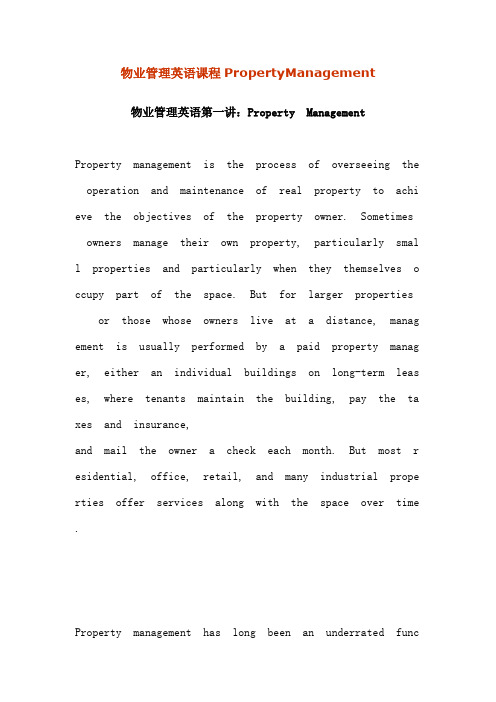
物业管理英语课程PropertyManagement物业管理英语第一讲:Property ManagementProperty management is the process of overseeing the operation and maintenance of real property to achi eve the objectives of the property owner. Sometimes owners manage their own property, particularly smal l properties and particularly when they themselves o ccupy part of the space. But for larger properties or those whose owners live at a distance, manag ement is usually performed by a paid property manag er, either an individual buildings on long-term leas es, where tenants maintain the building, pay the ta xes and insurance,and mail the owner a check each month. But most r esidential, office, retail, and many industrial prope rties offer services along with the space over time .Property management has long been an underrated function in the real estate industry. The need for p rofessional management did not become apparent until the depression of the 1930s, when numerous foreclo sures revealed a pattern of management deficiencies. This oversight might seem strange, since running a large commercial or residential project in which hundreds or thousands of people reside or work is a highly challenging task, calling for training, g ood judgment, variety of technical skills. Traditiona lly, however, emphasis in the real estate industry has been on the so permanent elements of the inves tment-good location, construction, and reasonable long -term financing-than on the day-to-day operation of the property. It has sometimes seemed as if a pr operty owner, having made a very large investment i n the permanent structure, assumed that the property would run itself with a minimum amount of supervi sion.This concept of property management has changed subs tantially in the past decade. In an era of rising costs, it has dawned on owners that good propertymanagement is the major controllable influence on residual cash flow (i. e., the number of dollars t hat end up in the owner’s pocket). It is true that both rent rates and op erating expenses are largely shaped by market forces beyond the control of any one property owner (wit ness the very sharp rise in energy costs in the 1 970s). But it is also true that comparable properti es within the same geographic area often show signi ficant variances in rental income and operating cost s. Why? Close inspection often shows that “above-av erage”operating expenses and lower than average re nt levels result from inadequate property management.The classic mistake of the stock and bond investor moving into real estate involves underestimating th e importance of management. Some investors have the feeling that real estate manages itself.There is a story about the importance of property management. A San Francisco real estate broker recently noticed a project that was on the market for $1 million. He knew how the property had been mana ged in the past and that the million dollar valuat ion was based on a capitalization of historic inc ome figure. He borrowed money to buy the property, renegotiated certain leases, and established more e fficient operating procedures. In six months he sold the property for $1.4 million based on the capita lized value of the new, higher net income. His con tribution was management expertise.Useful Expressions:at a distance 在远处along with 和,同,与……一道;加之call for 需要;要求rather than 而不是dawn on 开始(被人)理解,渐渐(使人)明白end up 结束,结尾;停止result for 由于,是……的结果be based on 基于;以……为根据Notes:1. Property management is the process of overseeing the operation and maintenanceof real property to achieve the objectives of the property owner.此句中,动词不定式to achieve the objectives of the property owner作目的状语。
物业管理情景英语.

物业管理情境英语一-------空调维修夏季到来.持续的高温天气让大家都酷暑难耐。
又是一个炎热的下午,张小姐打电话到客服中心,客服小王接听了电话。
Summer has come, Sustained high temperature makes people intolerable.This afterno onMiss Zhang called to service center,Wang,an assistant of theCenter answered the call.小王:您好,客服中心,请问有什么能帮你吗?Wang: Good afternoon,what can I do for you?张小姐:你好,我是12楼XXX公司的行政主管。
我们办公室的空调好像出问题了,你们能帮忙看一看吗?Miss Zhang:Hello, this is the Admin Supervisor from XXX Company on 12thfloor.Th e air conditioner of our office doesn't work. Could you come tocheck?小王:好的,我们马上就到。
Wang:No problem, we'll come soon.小王和维修人员立刻赶到了12楼,对该区域的中央空调系统进行了检测。
发现是空调过滤网堵塞,维修人员迅速对过滤网进行了清洗疏通。
空调很快就运行正常了。
Wang and a maintenance worker went to Miss Zhang’s office.They check theair conditioner system of this area and then found out that the filter hasbeen blocked.They cleaned the filter and the air conditioner could worksoon.小王:张小姐,进入夏季空调经常运行,长期的工作导致过滤网集聚大量的灰尘,我们会定期给空调进行过滤网清洗,有需要的话可以联系我们。
住宅物业英语
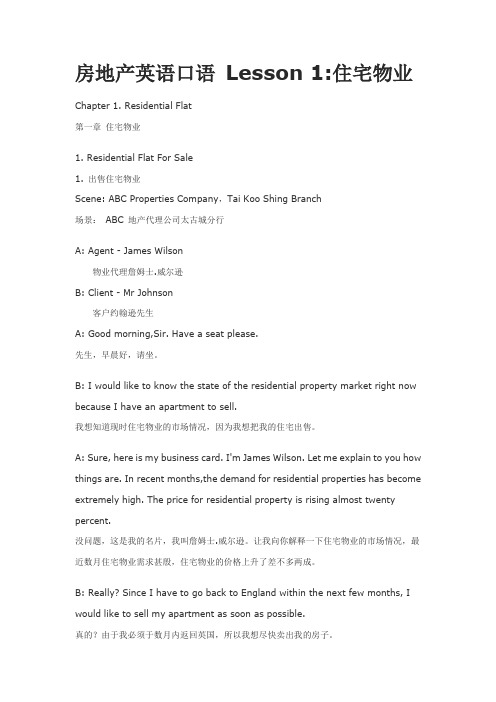
房地产英语口语Lesson 1:住宅物业Chapter 1. Residential Flat第一章住宅物业1. Residential Flat For Sale1. 出售住宅物业Scene: ABC Properties Company,Tai Koo Shing Branch场景:ABC 地产代理公司太古城分行A: Agent - James Wilson物业代理詹姆士.威尔逊B: Client - Mr Johnson客户约翰逊先生A: Good morning,Sir. Have a seat please.先生,早晨好,请坐。
B: I would like to know the state of the residential property market right now because I have an apartment to sell.我想知道现时住宅物业的市场情况,因为我想把我的住宅出售。
A: Sure, here is my business card. I'm James Wilson. Let me explain to you how things are. In recent months,the demand for residential properties has become extremely high. The price for residential property is rising almost twenty percent.没问题,这是我的名片,我叫詹姆士.威尔逊。
让我向你解释一下住宅物业的市场情况,最近数月住宅物业需求甚殷,住宅物业的价格上升了差不多两成。
B: Really? Since I have to go back to England within the next few months, I would like to sell my apartment as soon as possible.真的?由于我必须于数月内返回英国,所以我想尽快卖出我的房子。
物业管理英语培训课程(英文版)(doc 84页)

物业管理英语培训课程(英文版)(doc 84页)物业管理英语课程PropertyManagement物业管理英语第一讲:Property ManagementProperty management is the process of overseeing th e operation and maintenance of real property to ac hieve the objectives of the property owner. Sometim es owners manage their own property, particularly s mall properties and particularly when they themselve s occupy part of the space. But for larger proper ties or those whose owners live at a distance, management is usually performed by a paid property manager, either an individual buildings on long-te rm leases, where tenants maintain the building, pay the taxes and insurance,and mail the owner a check each month. But most residential, office, retail, and many industrial pro perties offer services along with the space over t ime.g costs, it has dawned on owners that good proper ty management is the major controllable influence o n residual cash flow (i. e., the number of dollar s that end up in the owner’s pocket). It is true that both rent rates and o perating expenses are largely shaped by market forc es beyond the control of any one property owner ( witness the very sharp rise in energy costs in th e 1970s). But it is also true that comparable pro perties within the same geographic area often show significant variances in rental income and operati ng costs. Why? Close inspection often shows that “above-average”operating expenses and lower than average rent levels result from inadequate property management.The classic mistake of the stock and bond investor moving into real estate involves underestimating t he importance of management. Some investors have th e feeling that real estate manages itself.There is a story about the importance of propertymanagement. A San Francisco real estate broker re cently noticed a project that was on the market f or $1 million. He knew how the property had been managed in the past and that the million dollar valuation was based on a capitalization of histor ic income figure. He borrowed money to buy the property, renegotiated certain leases, and establishe d more efficient operating procedures. In six month s he sold the property for $1.4 million based on the capitalized value of the new, higher net inc ome. His contribution was management expertise.Useful Expressions:at a distance 在远处along with 和,同,与……一道;加之call for 需要;要求rather than 而不是dawn on 开始(被人)理解,渐渐(使人)明白end up 结束,结尾;停止result for 由于,是……的结果be based on 基于;以……为根据Notes:1. Property management is the process of overseeing the operation and maintenanceof real property to achieve the objectives of the property owner.此句中,动词不定式to achieve the objectives of the property owner作目的状语。
物业管理的英语

物业管理的英语Property Management in EnglishProperty management is a dynamic and essential sector within the real estate industry, playing a crucial role in the upkeep and maintenance of residential, commercial, and industrial properties. In English, the term "property management" encompasses a wide range of services and responsibilities that ensure the smooth operation of various types of properties.Firstly, property management involves the day-to-day oversight of a property, which includes regular inspections to ensure that all facilities are in good working order. This can involve anything from maintaining the landscaping to ensuring that the plumbing and electrical systems are functioning correctly.Secondly, a significant aspect of property management is tenant relations. Managers are responsible for addressing tenant concerns, collecting rent, and enforcing the terms of leases. Effective communication and conflict resolutionskills are vital in this area to maintain a positive living or working environment for all occupants.Additionally, financial management is a key component of property management. This involves budgeting for maintenance costs, tracking income and expenses, and ensuring that theproperty remains a viable investment for the owner. Property managers must be adept at financial planning and analysis to make informed decisions that protect and enhance theproperty's value.Marketing and leasing are also important facets of property management. When vacancies occur, managers must market the property to attract new tenants or buyers. This can involve creating advertisements, hosting open houses, and negotiating leases. A deep understanding of the local real estate market and the ability to present the property in the best possible light are essential skills in this area.Furthermore, property management in English also extends to legal compliance and risk management. Managers must be knowledgeable about local laws and regulations that pertain to property ownership and tenant rights. They also need to implement safety measures and insurance policies to mitigate risks and protect the property from potential liabilities.Lastly, the future of property management is increasingly technological, with the integration of smart systems and digital platforms that streamline tasks such as billing, maintenance requests, and communication with tenants. Property managers who are tech-savvy and can adapt to new software and tools will be better equipped to provideefficient and effective services.In conclusion, property management is a multifaceted profession that requires a combination of business acumen, people skills, and technical knowledge. As the real estatemarket continues to evolve, property management will remain a vital service for property owners and occupants alike.。
物业管理专业英语
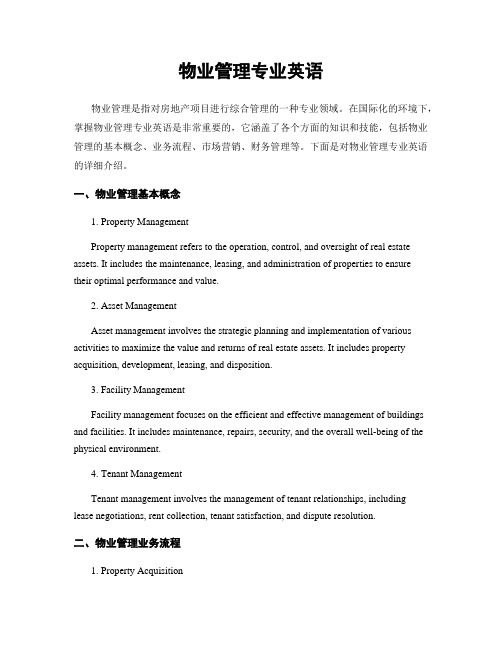
物业管理专业英语物业管理是指对房地产项目进行综合管理的一种专业领域。
在国际化的环境下,掌握物业管理专业英语是非常重要的,它涵盖了各个方面的知识和技能,包括物业管理的基本概念、业务流程、市场营销、财务管理等。
下面是对物业管理专业英语的详细介绍。
一、物业管理基本概念1. Property ManagementProperty management refers to the operation, control, and oversight of real estate assets. It includes the maintenance, leasing, and administration of properties to ensure their optimal performance and value.2. Asset ManagementAsset management involves the strategic planning and implementation of various activities to maximize the value and returns of real estate assets. It includes property acquisition, development, leasing, and disposition.3. Facility ManagementFacility management focuses on the efficient and effective management of buildings and facilities. It includes maintenance, repairs, security, and the overall well-being of the physical environment.4. Tenant ManagementTenant management involves the management of tenant relationships, includinglease negotiations, rent collection, tenant satisfaction, and dispute resolution.二、物业管理业务流程1. Property AcquisitionProperty acquisition is the process of acquiring real estate assets for investment or management purposes. It involves market research, property evaluation, financial analysis, and negotiation.2. Property DevelopmentProperty development refers to the construction or renovation of real estate assets to enhance their value and functionality. It includes project planning, design, construction, and project management.3. Property LeasingProperty leasing involves the marketing and leasing of properties to prospective tenants. It includes advertising, tenant screening, lease negotiations, and lease administration.4. Property MaintenanceProperty maintenance is the ongoing process of maintaining and repairing properties to ensure their proper functioning and appearance. It includes routine inspections, repairs, and preventive maintenance.5. Financial ManagementFinancial management in property management involves the management of property finances, including budgeting, accounting, financial analysis, and reporting. It ensures the financial stability and profitability of properties.6. Tenant RelationsTenant relations focus on building and maintaining positive relationships with tenants. It includes addressing tenant concerns, resolving disputes, and ensuring tenant satisfaction.7. Property DispositionProperty disposition is the process of selling or disposing of real estate assets. It involves market analysis, property valuation, marketing, and negotiation.三、物业管理市场营销1. Market ResearchMarket research is the process of gathering and analyzing data about the real estate market. It includes studying market trends, demand and supply dynamics, and competitor analysis.2. Property PromotionProperty promotion involves marketing properties to attract potential tenants or buyers. It includes advertising, online listings, property showings, and promotional events.3. Tenant ScreeningTenant screening is the process of evaluating potential tenants to ensure their suitability for a property. It includes background checks, credit checks, and reference verification.4. Lease NegotiationLease negotiation is the process of negotiating lease terms and conditions with tenants. It involves discussing rent, lease duration, maintenance responsibilities, and other lease provisions.5. Tenant RetentionTenant retention focuses on keeping existing tenants satisfied and renewing their leases. It includes addressing tenant concerns, providing excellent customer service, and offering incentives for lease renewal.四、物业管理财务管理1. BudgetingBudgeting is the process of estimating and allocating financial resources for property operations and maintenance. It involves forecasting income and expenses, setting financial goals, and monitoring financial performance.2. AccountingAccounting in property management involves recording, analyzing, and reporting financial transactions. It includes bookkeeping, financial statement preparation, and tax compliance.3. Financial AnalysisFinancial analysis is the evaluation of property financial performance and investment potential. It includes analyzing income and expenses, calculating key financial ratios, and assessing investment returns.4. Cost ControlCost control focuses on minimizing expenses and optimizing operational efficiency. It includes monitoring expenses, identifying cost-saving opportunities, and implementing cost reduction strategies.5. ReportingReporting involves the preparation and presentation of financial reports to stakeholders. It includes monthly financial statements, annual budgets, variance analysis, and performance reports.以上内容详细介绍了物业管理专业英语的基本概念、业务流程、市场营销和财务管理。
物业管理英语第一讲PropertyManagement
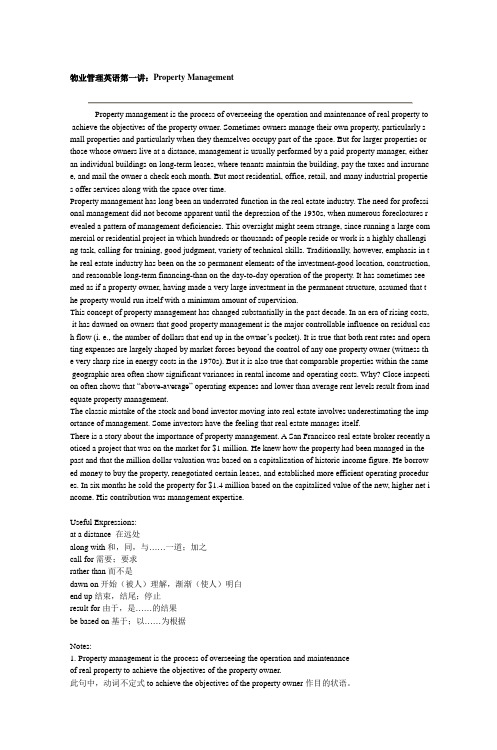
物业管理英语第一讲:Property ManagementProperty management is the process of overseeing the operation and maintenance of real property to achieve the objectives of the property owner. Sometimes owners manage their own property, particularly s mall properties and particularly when they themselves occupy part of the space. But for larger properties or those whose owners live at a distance, management is usually performed by a paid property manager, either an individual buildings on long-term leases, where tenants maintain the building, pay the taxes and insuranc e, and mail the owner a check each month. But most residential, office, retail, and many industrial propertie s offer services along with the space over time.Property management has long been an underrated function in the real estate industry. The need for professi onal management did not become apparent until the depression of the 1930s, when numerous foreclosures r evealed a pattern of management deficiencies. This oversight might seem strange, since running a large com mercial or residential project in which hundreds or thousands of people reside or work is a highly challengi ng task, calling for training, good judgment, variety of technical skills. Traditionally, however, emphasis in t he real estate industry has been on the so permanent elements of the investment-good location, construction, and reasonable long-term financing-than on the day-to-day operation of the property. It has sometimes see med as if a property owner, having made a very large investment in the permanent structure, assumed that t he property would run itself with a minimum amount of supervision.This concept of property management has changed substantially in the past decade. In an era of rising costs, it has dawned on owners that good property management is the major controllable influence on residual cas h flow (i. e., the number of dollars that end up in the owner‟s pocket). It is true that both rent rates and opera ting expenses are largely shaped by market forces beyond the control of any one property owner (witness th e very sharp rise in energy costs in the 1970s). But it is also true that comparable properties within the same geographic area often show significant variances in rental income and operating costs. Why? Close inspecti on often shows that “above-average” operating expenses and lower than average rent levels result from inad equate property management.The classic mistake of the stock and bond investor moving into real estate involves underestimating the imp ortance of management. Some investors have the feeling that real estate manages itself.There is a story about the importance of property management. A San Francisco real estate broker recently n oticed a project that was on the market for $1 million. He knew how the property had been managed in the past and that the million dollar valuation was based on a capitalization of historic income figure. He borrow ed money to buy the property, renegotiated certain leases, and established more efficient operating procedur es. In six months he sold the property for $1.4 million based on the capitalized value of the new, higher net i ncome. His contribution was management expertise.Useful Expressions:at a distance 在远处along with 和,同,与……一道;加之call for 需要;要求rather than 而不是dawn on 开始(被人)理解,渐渐(使人)明白end up 结束,结尾;停止result for 由于,是……的结果be based on 基于;以……为根据Notes:1. Property management is the process of overseeing the operation and maintenanceof real property to achieve the objectives of the property owner.此句中,动词不定式to achieve the objectives of the property owner作目的状语。
物业管理专业英语(1)

• Week 4
物业管理专业英语(1)
• 更确切地讲,物业管理公司的业务可以 分为以下四种类型:1、一般业务,包括 房屋的维护和公共设施的分段维修;2、 特殊业务,包括保安、清洁、绿化和停 车;3、居民委托的专项服务,例如,递 送报纸或预定机票等;4、其他业务,如 内装饰和维修,房屋交易,租赁和出租 等。后两项业务需要额外收费。
物业管理专业英语(1)
• 5、这么高的品质,这样的价格很值。 • It is worthwhile because of its high
quality.
物业管理专业英语(1)
• 6、简单来说,物业是指一个人所拥有的资 产。 • In plain terms, property is what one owns.
• A:好的。我先记下来。Lisa,268号房,厕所堵塞。今天下 午3点怎样?你那时有空么?
• A: Ok. Let me put it down. Lisa number 268, toilet was plugged. How about 3:00 pm this afternoon? Will you be available at that time?
• B: That’ too ___. The up stair neighbors dance at night and frequently hold parties in their house lasting for quite a long time.
• A: Yes, that’ too bad. But don’t ____, we will take an investigation with regard to this matter.
物业管理方案英文
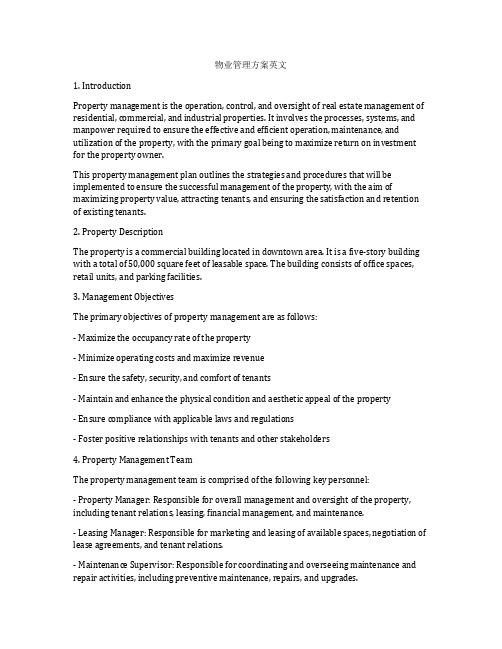
物业管理方案英文1. IntroductionProperty management is the operation, control, and oversight of real estate management of residential, commercial, and industrial properties. It involves the processes, systems, and manpower required to ensure the effective and efficient operation, maintenance, and utilization of the property, with the primary goal being to maximize return on investment for the property owner.This property management plan outlines the strategies and procedures that will be implemented to ensure the successful management of the property, with the aim of maximizing property value, attracting tenants, and ensuring the satisfaction and retention of existing tenants.2. Property DescriptionThe property is a commercial building located in downtown area. It is a five-story building with a total of 50,000 square feet of leasable space. The building consists of office spaces, retail units, and parking facilities.3. Management ObjectivesThe primary objectives of property management are as follows:- Maximize the occupancy rate of the property- Minimize operating costs and maximize revenue- Ensure the safety, security, and comfort of tenants- Maintain and enhance the physical condition and aesthetic appeal of the property- Ensure compliance with applicable laws and regulations- Foster positive relationships with tenants and other stakeholders4. Property Management TeamThe property management team is comprised of the following key personnel:- Property Manager: Responsible for overall management and oversight of the property, including tenant relations, leasing, financial management, and maintenance.- Leasing Manager: Responsible for marketing and leasing of available spaces, negotiation of lease agreements, and tenant relations.- Maintenance Supervisor: Responsible for coordinating and overseeing maintenance and repair activities, including preventive maintenance, repairs, and upgrades.- Security Supervisor: Responsible for the safety and security of the property, including access control, surveillance, and emergency response.5. Leasing and Tenant RelationsThe leasing and tenant relations strategy will focus on the following key areas:- Marketing: Develop and implement a comprehensive marketing strategy to attract and retain tenants, including online and offline marketing efforts.- Tenant selection: Implement a thorough screening process for potential tenants to ensure suitability and reliability.- Lease negotiation: Develop and implement a leasing strategy that maximizes rental rates and lease terms, while meeting the needs of tenants.- Tenant satisfaction: Implement a tenant satisfaction program to ensure the needs and concerns of tenants are addressed in a timely and effective manner.6. Financial ManagementThe financial management strategy will focus on the following key areas:- Budgeting: Develop and implement a detailed annual operating budget that outlines projected revenue and expenses.- Revenue management: Implement strategies to maximize rental income, including proactive lease management, rent increase strategies, and ancillary income opportunities.- Expense management: Monitor and control operating expenses, including utilities, maintenance, insurance, and property taxes.- Financial reporting: Provide regular financial reports to the property owner, including income statements, balance sheets, and cash flow statements.7. Maintenance and OperationsThe maintenance and operations strategy will focus on the following key areas:- Preventive maintenance: Implement a proactive maintenance program to ensure the long-term integrity and functionality of the property.- Repairs and upgrades: Develop and implement a plan for addressing repairs, upgrades, and improvements to the property, including regular inspections and assessments.- Sustainability: Implement sustainable practices and procedures to minimize environmental impact and reduce operating costs.- Emergency response: Develop and implement an emergency response plan to address potential safety and security issues, including fire drills, evacuation procedures, and emergency contacts.8. Safety and SecurityThe safety and security strategy will focus on the following key areas:- Access control: Implement measures to control and monitor access to the property, including the use of key cards, security personnel, and surveillance cameras.- Surveillance: Install and maintain surveillance cameras throughout the property to monitor and record activity.- Security personnel: Employ trained security personnel to patrol the property, respond to incidents, and provide a visible security presence.- Emergency response: Develop and implement emergency response protocols, including evacuation procedures, emergency contacts, and coordination with local law enforcement and emergency services.9. Regulatory ComplianceThe regulatory compliance strategy will focus on the following key areas:- Zoning and land use: Ensure compliance with local zoning and land use regulations, including allowable uses, setbacks, parking requirements, and signage ordinances.- Building codes: Ensure compliance with local building codes and regulations, including occupancy limits, fire safety, and accessibility requirements.- Environmental regulations: Ensure compliance with environmental regulations, including waste disposal, hazardous materials handling, and energy efficiency standards.- Health and safety regulations: Ensure compliance with health and safety regulations, including sanitation, ventilation, and workplace safety standards.10. ConclusionThis property management plan outlines the strategies and procedures that will be implemented to ensure the successful management of the property. By focusing on leasing and tenant relations, financial management, maintenance and operations, safety and security, and regulatory compliance, the property management team aims to maximize property value, attract and retain tenants, and ensure the satisfaction and retention of existing tenants. Through the implementation of these strategies, the property owner can expect to achieve a strong return on investment and a well-maintained and profitable property.。
小区物业服务基础英文培训
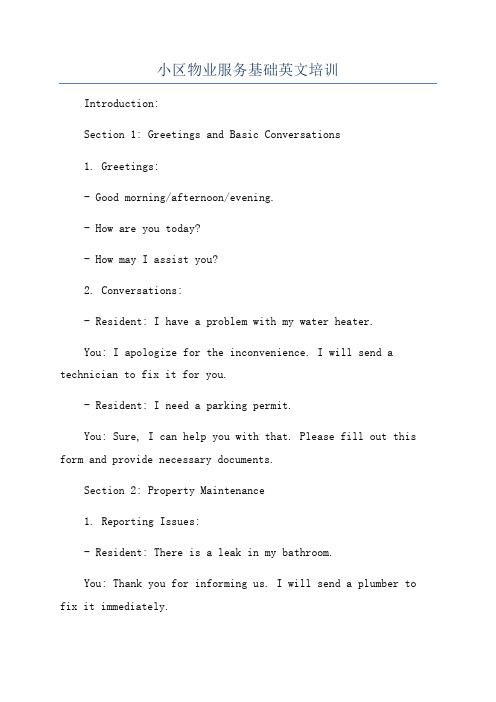
小区物业服务基础英文培训Introduction:Section 1: Greetings and Basic Conversations1. Greetings:- Good morning/afternoon/evening.- How are you today?- How may I assist you?2. Conversations:- Resident: I have a problem with my water heater.You: I apologize for the inconvenience. I will send a technician to fix it for you.- Resident: I need a parking permit.You: Sure, I can help you with that. Please fill out this form and provide necessary documents.Section 2: Property Maintenance1. Reporting Issues:- Resident: There is a leak in my bathroom.You: Thank you for informing us. I will send a plumber to fix it immediately.- Resident: The elevator is not working.You: I apologize for the inconvenience. I will contact the maintenance team to check and repair it as soon as possible.2. Cleaning Schedule:- Resident: Can you clean my apartment?1. Active Listening:- Resident: I have been facing noise issues from my neighbors.2. Apologizing and Assuring:- Resident: It has been a week, and my issue is still not resolved.You: I apologize for the delay. I will personally follow up with the team to ensure your issue is resolved within 24 hours.3. Offering Solutions:- Resident: I need assistance with moving my belongings to another apartment.Conclusion:。
物业管理相关英语(ppt 17页)

• before long • 不久以后 • long before ห้องสมุดไป่ตู้ 在很久以前
recruit [rɪ'krut]
• 雇用;聘请
• They recruited a number of old teachers for the new school.
• 他们给这所新学校聘请了一些老教师。
• 招聘,招募, 征募(新兵),吸收(新成员)
• n.财产,所有物;房产,物业;性质,性能
• 2. real estate ['ri:l i'steit]
• n. 地产,不动产
世界城市:
• Los Angeles [lɔs‘ændʒələs] 洛杉矶
• Paris [’pæris] 巴黎 • Tokyo [’təukjəu] 东京 • Sydney [’sidni] 悉尼 • Melbourne [‘melbən] 墨尔本 • 伦敦、纽约、华盛顿….
Let's get together for some chitchat.
• 3. 查阅英文专业资料(look up English material)
学习要求(learning request)
• 记笔记(笔记也是 考试的范围) • 读写训练 • 情境表演
考试(test )
• 考勤 • 课堂提问 • 作业 • 口语考试 • 笔试
• 3. 坚持;主张;断言[+(that)] He maintains that he once saw a UFO. 他坚持称自己曾看见过飞碟。
• 4. 供养,抚养;负担,支持 Mr. Smith maintains his son at college. 史密斯先生供养念大学的儿子
住宅物业英语
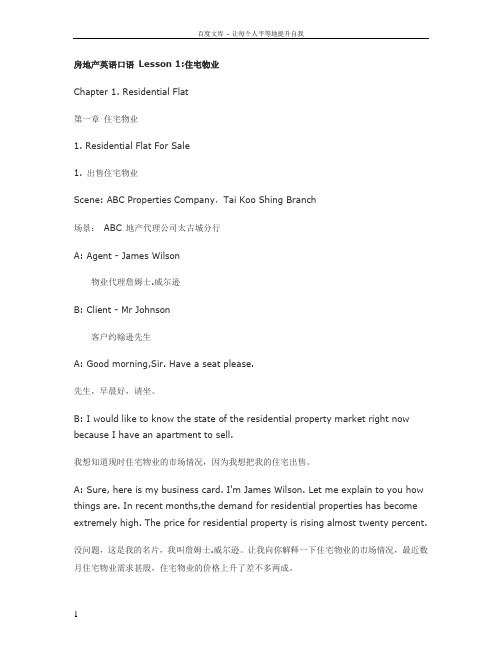
房地产英语口语Lesson 1:住宅物业Chapter 1. Residential Flat第一章住宅物业1. Residential Flat For Sale1. 出售住宅物业Scene: ABC Properties Company,Tai Koo Shing Branch场景:ABC 地产代理公司太古城分行A: Agent - James Wilson物业代理詹姆士.威尔逊B: Client - Mr Johnson客户约翰逊先生A: Good morning,Sir. Have a seat please.先生,早晨好,请坐。
B: I would like to know the state of the residential property market right now because I have an apartment to sell.我想知道现时住宅物业的市场情况,因为我想把我的住宅出售。
A: Sure, here is my business card. I'm James Wilson. Let me explain to you how things are. In recent months,the demand for residential properties has become extremely high. The price for residential property is rising almost twenty percent.没问题,这是我的名片,我叫詹姆士.威尔逊。
让我向你解释一下住宅物业的市场情况,最近数月住宅物业需求甚殷,住宅物业的价格上升了差不多两成。
B: Really? Since I have to go back to England within the next few months, I would like to sell my apartment as soon as possible.真的?由于我必须于数月内返回英国,所以我想尽快卖出我的房子。
物业管理相关英语(ppt 17页)

学习要求(learning request)
• 记笔记(笔记也是 考试的范围) • 读写训练 • 情境表演
考试(test )
• 考勤 • 课堂提问 • 作业 • 口语考试 • 笔试
平时成绩40%
3Hale Waihona Puke % 30%Series 1 History of Founder Limited
Act 1 Introduction of the Management Team
maintain [mein’tein]
vt.维持;维修,保养;坚持;赡养
• 1. 维持;保持;使继续 Ann and Mary maintained their friendship for the next thirty years. 安妮和玛丽在此后的三十年中一直保持着她们之间的友谊。
• 2. 维修,保养 Frank maintains his car very well. 弗兰克把自己的车子保养得很好。
• Were the new member recruited from the ChongQing City Management College?
• 那个新人是从城管学院招聘的吗?
•
Staff 英音:[stɑ:f] 美音:[stæf]
• 名词 n. (全体)职员,(全体)工作人员 The teaching staff of this college is/are excellent. 这所大学的教师都是出类拔萃的。
• 3. 坚持;主张;断言[+(that)] He maintains that he once saw a UFO. 他坚持称自己曾看见过飞碟。
• 4. 供养,抚养;负担,支持 Mr. Smith maintains his son at college. 史密斯先生供养念大学的儿子
- 1、下载文档前请自行甄别文档内容的完整性,平台不提供额外的编辑、内容补充、找答案等附加服务。
- 2、"仅部分预览"的文档,不可在线预览部分如存在完整性等问题,可反馈申请退款(可完整预览的文档不适用该条件!)。
- 3、如文档侵犯您的权益,请联系客服反馈,我们会尽快为您处理(人工客服工作时间:9:00-18:30)。
物业管理英语第一讲:Property ManagementProperty management is the process of overseeing the operation and ma intenance of real property to achieve the objectives of the property owner. Sometimes owners manage their own property, particularly small properties and particularly when they themselves occupy part of the space. But for larger properties or those whose owners live at a dis tance, management is usually performed by a paid property manager, ei ther an individual buildings on long-term leases, where tenants maint ain the building, pay the taxes and insurance,and mail the owner a check each month. But most residential, office, retail, and many industrial properties offer services along with the space over time.Property management has long been an underrated function in the real estate industry. The need for professional management did not become apparent until the depression of the 1930s, when numerous foreclosur es revealed a pattern of management deficiencies. This oversight migh t seem strange, since running a large commercial or residential proj ect in which hundreds or thousands of people reside or work is a high ly challenging task, calling for training, good judgment, variety of technical skills. Traditionally, however, emphasis in the real estate industry has been on the so permanent elements of the investment-goo d location, construction, and reasonable long-term financing-than on the day-to-day operation of the property. It has sometimes seemed as if a property owner, having made a very large investment in the perm anent structure, assumed that the property would run itself with a mi nimum amount of supervision.This concept of property management has changed substantially in the past decade. In an era of rising costs, it has dawned on owners that good property management is the major controllable influence on resid ual cash flow (i. e., the number of dollars that end up in the owner’s pocket). It is true that both rent rates and operating expenses are largely shaped by market forces beyond the control of any one proper ty owner (witness the very sharp rise in energy costs in the 1970s). But it is also true that comparable properties within the same geogra phic area often show significant variances in rental income and opera ting costs. Why? Close inspection ofte n shows that “above-average” operating expenses and lower than average rent levels result from ina dequate property management.The classic mistake of the stock and bond investor moving into real e state involves underestimating the importance of management. Some inv estors have the feeling that real estate manages itself.There is a story about the importance of property management. A San F rancisco real estate broker recently noticed a project that was on th e market for $1 million. He knew how the property had been managed in the past and that the million dollar valuation was based on a capita lization of historic income figure. He borrowed money to buy the pro perty, renegotiated certain leases, and established more efficient op erating procedures. In six months he sold the property for $1.4 milli on based on the capitalized value of the new, higher net income. His contribution was management expertise.Useful Expressions:at a distance 在远处along with 和,同,与……一道;加之call for 需要;要求rather than 而不是dawn on 开始(被人)理解,渐渐(使人)明白end up 结束,结尾;停止result for 由于,是……的结果be based on 基于;以……为根据Notes:1. Property management is the process of overseeing the operation and maintenanceof real property to achieve the objectives of the property owner.此句中,动词不定式to achieve the objectives of the property owner作目的状语。
property management物业管理real property 房产property owner 业主2. …or those whose owners live at a distance, management is usually performedby a paid property manager, either an individual or a management firm.此句中,关系代词whose在定语从句中充当定语,该定语从句修饰指示代词tho se.Either…or表示选择,可以连接两个并列的词、词组或独立分句。
在此句中,e ither…or连接的成分是a paid propertymanager 的同位语,作进一步的解释。
3. there are exceptions…buildings…,where tenants maintain the buil dingon a long-term leases, pay the taxes…。
此句中,关系副词where在定语从句中作地点状语,由它引导的定语从句修饰b uildings.on a long-term leases意为“长期租赁”。
4. Property management has long been an underrated function…。
Long在此句中是副词,作时间状语,underrated是过去分词,作function的定语。
5. not…until意为“直到……才”。
例如:The baby did not go to bed until his mother came back home.6. …since running a large commercial or residential project in which hundredsor thousands of people reside or work is a highly challenging task…。
